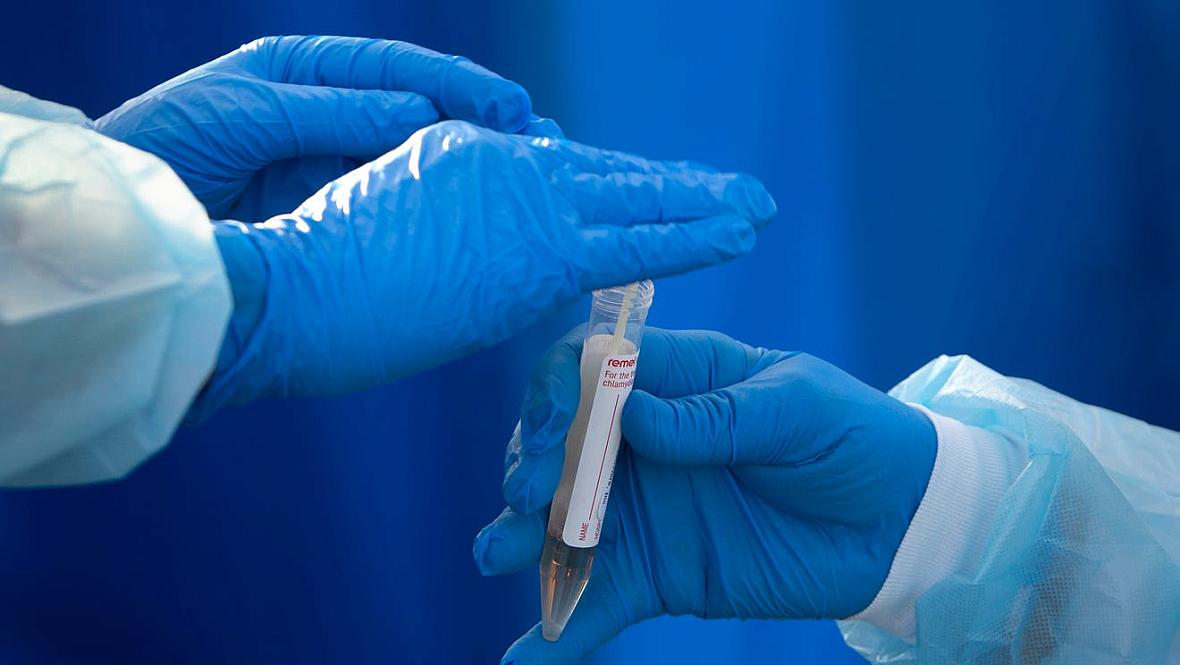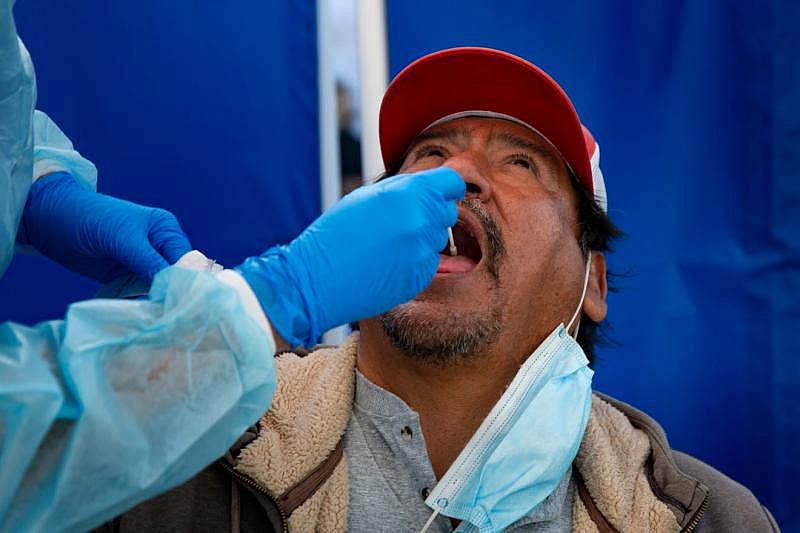What is Florida’s plan for vaccinating thousands of farmworkers? It’s unclear
This story was produced by Janine Zeitlin, a participant in the USC Annenberg Center for Health Journalism's 2020 Data Fellowship.
Her other stories include:
Nikki Fried to Gov. DeSantis: Give Florida farmworkers, all teachers COVID-19 vaccines now
How Florida left farmworkers out of its COVID-19 pandemic response
Florida farmworkers struggled to get vaccinated. But health officials finding ways to help
We had to work twice as hard': How the pandemic magnified inequities for Florida's migrant students

Florida Department of Health in Collier Count, DOH-Collier, health professionals secure a test sample, Tuesday, Dec. 29, 2020, at a COVID-19 testing site at Farm Workers Village in Immokalee.
Jon Austria/Naples Daily News USA TODAY NETWORK - FLORIDA
Florida counts more than 100,000 farmworkers, but the governor has not announced a plan for when or how to reach this vulnerable population with the state’s limited COVID-19 vaccinations.
Because of their high risk and role in bringing fresh produce to tables during the winter season, advocates and the state’s agriculture commissioner say they should be included in the next wave of shots.
Florida Department of Agriculture & Consumer Services Commissioner Nikki Fried has “strongly advocated” that farmworkers and agriculture personnel be included in the “critical infrastructure category,” likely the next phase, wrote Franco Ripple, the agency’s communications director, in an email.
Martin Victoria of Immokalee provides samples for a COVID-19 test Dec. 29 at a state-run testing site at Farm Workers Village in Immokalee. Jon Austria/Naples Daily News
The department does not have the authority to make vaccines available, he said. “The Governor has given our department neither vaccines to provide nor a timeline of when vaccines would be available to farmworkers and others in agriculture."
The agency is working with the University of Florida on a farmworker vaccine education campaign, Ripple said, but “we are not aware of any comprehensive plan by the Governor to ensure farmworkers, as essential workers, receive vaccinations."
But there should be one, say farmworker advocates, given the barriers to access.
“What we have is a situation where people who have Internet access, people who are very connected, are the ones who are receiving the vaccine,” said Julia Perkins of the Coalition of Immokalee Workers, a force for farmworker advocacy in Florida. “There must be an understanding of the unique needs of vulnerable communities.”
Farmworkers’ fears
Agricultural workers feel particularly susceptible to COVID-19 infection.
On a recent evening, Martin Victoria joined the line for COVID-19 testing in the eastern Collier County town of Immokalee, one of several inland Florida rural communities that emerged as virus hotspots last year.
He was there out of worry. Victoria drives a bus of 30-some tomato pickers to fields that make this community a winter harvesting hub for the nation. Victoria wears a mask but said workers often take their masks off once inside.
“I’ve always worked in farm labor and I like it. But now, with what’s happening, there’s a lot of risk,” said Victoria, who has worked in Florida agriculture for more than three decades since arriving from Mexico.
He’s considering other work but would need to improve his English, he said.
Seniors before workers
Gov. Ron DeSantis’ December executive order outlines only the first phase of distribution, saying providers “shall only” vaccinate long-term care facility residents and staff, healthcare workers with direct patient contact and those age 65 and older.
More:22 Publix stores in Florida to provide COVID-19 vaccinations for seniors
At a Dec. 22 news conference, DeSantis emphasized that Florida would prioritize its elderly population before non-health care essential workers.
“Let me just be very, very clear. Our vaccines are going to be targeted for our elderly population,” DeSantis said. “We’re not going to put young healthy workers ahead of our vulnerable elderly population.”
Armando Izaguirre, of Immokalee, has a bandage applied to his arm after receiving his COVID-19 vaccine during a Healthcare Network vaccination clinic, Tuesday, Feb 9, 2021, in Immokalee. Jon Austria/Naples Daily News USA TODAY NETWORK - FLORIDA
In this approach, DeSantis veered from the federal Centers for Disease Control and Prevention advisory panel’s guidance that suggested vaccines be offered to non-health care essential workers, including agricultural workers, even before people between ages 65 and 74.
The panel classified them as “frontline workers.” The list also includes first responders, teachers and grocery store workers.
The federal panel noted its reasoning: the workers face a high COVID-19 risk as they must be on-site and work less than six feet from each other and the public. It pointed to reports of “high incidence and outbreaks” in workplaces and the “disproportionate impact of COVID-19 on workers who belong to racial and ethnic minority groups.”
DeSantis did announce a plan Monday that includes identifying churches in order to funnel vaccinations to “underserved communities.”
Vaccination barriers
The first vaccine distribution in Immokalee, which was held Tuesday, was not targeted to an aging farmworker population. It was held during the workday. The signup was online, making it inaccessible for people without Internet.
Many people there Tuesday were not from Immokalee, some coming from as far as Sarasota and Broward counties. A longtime Immokalee resident didn’t recognize anyone in line.
The online form does not ask where people live, said Kristine Hollingsworth, a health department spokeswoman in Collier County, who noted registration forms are in English, Spanish and Creole.
It’s unclear to what extent officials tried to reach non-English speakers before the sign-up, but they are working to spread the word about future vaccinations on Spanish-language radio. Eighty percent of Immokalee residents speak a language other than English at home, according to the Census.
Local health officials and the nonprofit Healthcare Network are collaborating on how to better reach the Immokalee community with future vaccinations.
The Healthcare Network will vaccinate Immokalee farmworkers as soon as state guidelines allow and will work with other organizations to develop outreach strategies, spokeswoman Gabrielle O’Boyle said in an email.
A multilingual team will address barriers such as language, transportation and vaccine hesitancy. The network plans to partner with the health department to hold clinics on weekends and extended hours and reach out to farms to offer vaccine clinics.
The Coalition of Immokalee Workers is advocating for farmworkers to be prioritized in the next round of vaccines, said Nely Rodriguez, a coalition staff member, noting how susceptible they are to COVID-19 infection because of their work and housing conditions.
“It’s a very difficult job that you can’t do from home,” Rodriguez said. “The work that they do should be recognized and valued.”
Farmworkers often live in crowded trailers without space to distance or isolate. They are not guaranteed sick pay or time off, she said. They commute to fields in buses, and many suffer from pre-existing health conditions, sometimes related to the work they do.
The D.C.-based American Farm Bureau Federation, which represents agricultural producers, echoed the coalition’s calls to prioritize farmworkers and others in the food supply chain because of the high stakes for not doing so.
Agriculture can’t feed the country from home, said Allison Crittenden, the bureau’s director of congressional relations. “It’s important to not see any supply chain disruptions like we experienced early on in the pandemic.”
Victoria, the Immokalee farmworker, received his COVID-19 results after struggling to access them online: he was positive. Though he thinks some agricultural workers may be skeptical of the vaccine, he would take it “if they tell me it’s OK.”
Staff writer Liz Freeman contributed to this report.
Janine Zeitlin is an enterprise reporter in Southwest Florida. Consider supporting local journalism by subscribing. Connect with her on Twitter @JanineZeitlin or at jzeitlin@gannett.com.
She reported this story while participating in the USC Annenberg Center for Health Journalism's 2020 Data Fellowship.
[This story was originally published by News-Press and appeared in multiple USA Today Network newspapers throughout Florida.]
Did you like this story? Your support means a lot! Your tax-deductible donation will advance our mission of supporting journalism as a catalyst for change.

